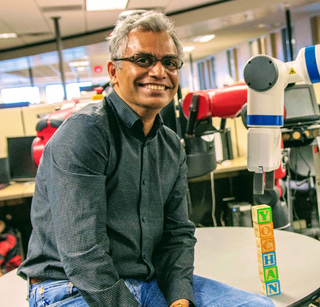Invited Speakers
We are pleased to have the following invited speakers at SoCS 2019:
 Torsten Schaub |
Torsten SchaubTalk Title: Answer Set Programming in a NutshellAbstract:
Answer Set Programming (ASP) has become a popular approach to declarative problem solving.
More precisely, ASP is a rule-based formalism for modeling and solving knowledge-intense combinatorial (optimization) problems.
What makes ASP attractive is its combination of a declarative modeling language with highly effective solving engines.
This allows us to concentrate on specifying - rather than programming the algorithm for solving - a problem at hand.
Historically, ASP has its roots in deductive databases, logic programming, and non-monotonic reasoning;
its solving engines draw on the same technology as solvers for satisfiability testing.
Given this origin, ASP is tailored to support closed as well as open world reasoning,
which makes it predestined for knowledge representation and reasoning tasks.
Interesting applications of ASP can be found in decision support systems, industrial team-building, music composition,
natural language processing, product and software configuration, phylogeneticics, robotics, systems biology, timetabling,
and many more.
This is an EurAI sponsored talk. About the Speaker:Torsten Schaub is university professor for knowledge processing and information systems at the University of Potsdam in Germany. Since 2014 he also holds an Inria International Chair at Inria Rennes - Bretagne Atlantique. He is a fellow of the European Association for Artificial Intelligence EurAI and serves as president of the Association of Logic Programming. His research interests range from theoretic foundations to practical implementation of reasoning from incomplete, inconsistent, and evolving information. His current research focus lies on Answer set programming and materializes at potassco.org, the home of the open source project Potassco bundling software for Answer set programming developed at the University of Potsdam. |
 Subbarao Kambhampati |
Subbarao KambhampatiTalk Title: Synthesizing Explainable Behavior for Human-AI CollaborationAbstract:As AI technologies enter our everyday lives at an ever increasing pace, there is a greater need for AI systems to work synergistically with humans. This requires AI systems to exhibit behavior that is explainable to humans. Synthesizing such behavior requires AI systems to reason not only with their own models of the task at hand, but also about the mental models of the human collaborators. This in turn involves combinatorial search in the model space. Using several case-studies from our ongoing research, I will discuss how such multi-model planning forms the basis for explainable behavior. About the Speaker:Subbarao Kambhampati (Rao) is a professor of Computer Science at Arizona State University. He received his B.Tech. in Electrical Engineering (Electronics) from Indian Institute of Technology, Madras (1983), and M.S.(1985) and Ph.D.(1989) in Computer Science (1985,1989) from University of Maryland, College Park. Kambhampati studies fundamental problems in planning and decision making, motivated in particular by the challenges of human-aware AI systems. Kambhampati is a fellow of AAAI and AAAS, and was an NSF Young Investigator. He received multiple teaching awards, including a university last lecture recognition. Kambhampati is the past president of AAAI and was a trustee of IJCAI. He was the program chair for IJCAI 2016 , ICAPS 2013, AAAI 2005 and AIPS 2000. He served on the board of directors of Partnership on AI. Kambhampati’s research as well as his views on the progress and societal impacts of AI have been featured in multiple national and international media outlets. URL: rakaposhi.eas.asu.edu Twitter @rao2z |